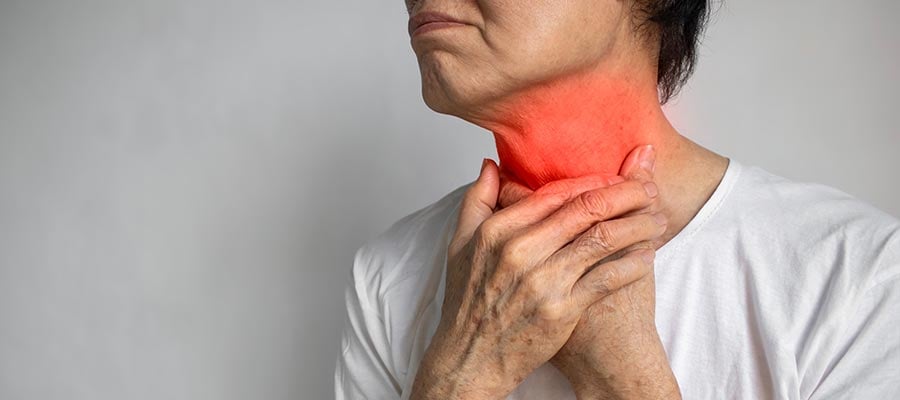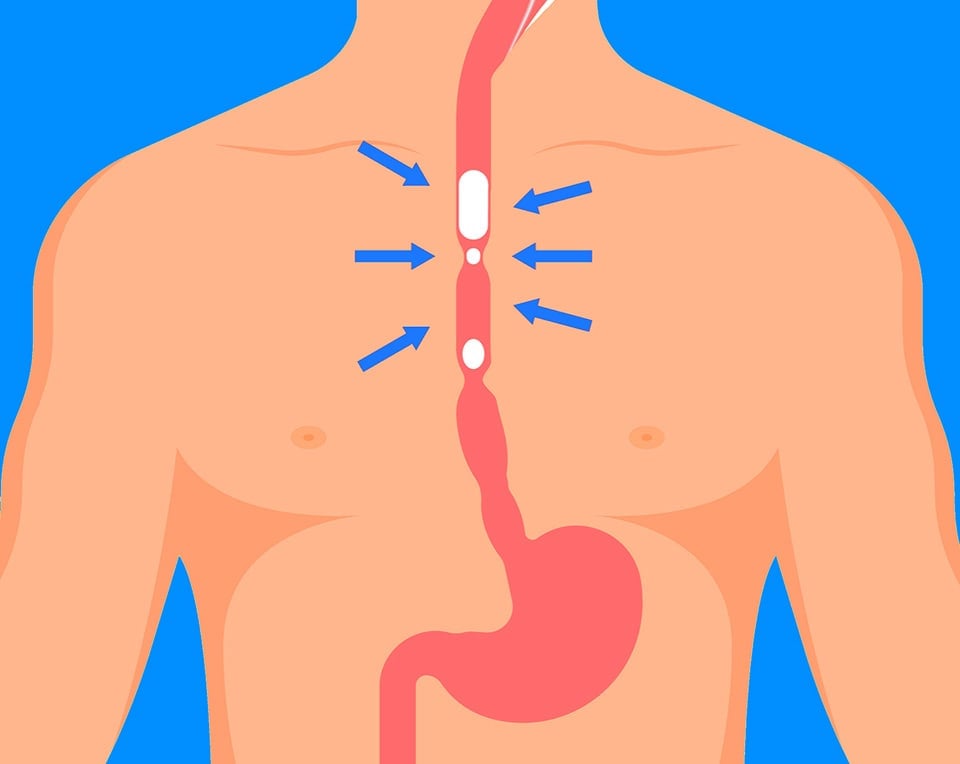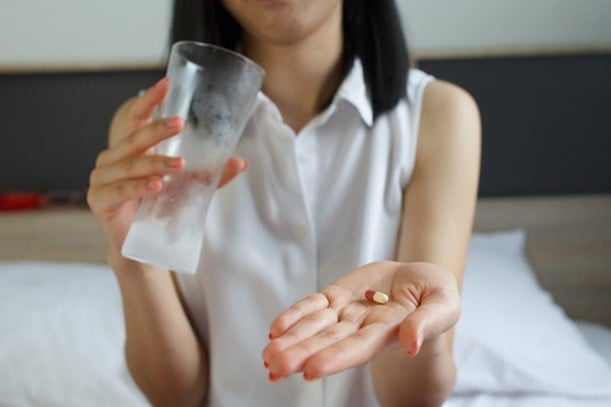Esophageal stricture is a serious consequence of many different pathological processes. Early and proactive detection and treatment are crucial to restoring the patency of the esophagus.
1. The dangers of esophageal narrowing
Esophageal stricture is a condition characterized by abnormal narrowing of the esophagus. The esophagus loses its ability to expand, and this condition can be localized or widespread along its entire length.
The most common cause of esophageal narrowing is long-standing gastroesophageal reflux disease (GERD), where stomach acid flows back from the stomach into the esophagus and causes inflammation of the esophagus. Other possible causes include previous surgery, other esophageal procedures, radiation therapy, or swallowing a corrosive substance that damages the esophagus.
Patients with esophageal stenosis often experience difficulty swallowing, a feeling that food is stuck to their throat, or a sensation that food is moving slowly through the throat, chest, and upper abdomen.
Initially, patients may have difficulty swallowing solid food, but as the condition worsens, they may also have difficulty swallowing liquids. Patients may also experience heartburn, reflux, pain when swallowing, hoarseness, sore throat, unexplained cough, or unintentional weight loss.

Esophageal narrowing causes patients to have difficulty swallowing, pain when swallowing, hoarseness, etc.
2. How is esophageal stricture treated?
Treatments for esophageal stricture aim to reduce symptoms, control complications, and treat the underlying causes of the disorder.
Esophageal dilation is the initial treatment of choice for symptomatic benign esophageal strictures. Although various types of dilators exist, balloon dilators are commonly used and can be performed during endoscopy.
Depending on the severity and complexity of the stricture, multiple dilations may be necessary to achieve adequate symptom relief. Caution is advised due to the risk of perforation during esophageal dilation.
For some patients who do not achieve symptom relief despite regular dilation, corticosteroid injections after dilation may be needed to reduce recurrence of strictures, or temporary esophageal stenting may be required.
The most common cause of esophageal narrowing is long-standing gastroesophageal reflux disease (GERD), where stomach acid flows back from the stomach into the esophagus and causes inflammation of the esophagus.
3. Medications used in the treatment of esophageal stricture
Once the esophagus is dilated, medication is also an important part of the treatment plan.
3.1. Proton pump inhibitors for the treatment of esophageal stricture
- Effects: Proton pump inhibitors (PPIs) are considered the most effective type of medication for controlling the effects of gastroesophageal reflux, preventing the stomach from secreting acid and potentially helping the esophagus heal, preventing recurrent narrowing.
PPIs tend to work best on an empty stomach, about 30-60 minutes before a meal. If taking a PPI once a day, take it before the first meal of the day. If taking a PPI twice a day, it's best to take the dose before breakfast and dinner.
These medications include: omeprazole, esomeprazole, lansoprazole, pantoprazole, and rabeprazole.
- Side effects: Although PPIs are well tolerated and considered safe, widespread long-term use can cause some side effects such as headaches, nausea, impaired absorption of vitamin B12, calcium, iron, and magnesium, hip fractures, pneumonia, dementia, and Clostridium difficile infections.
The best current strategies for minimizing the potential risks of long-term PPIs are to avoid prescribing them when not indicated and to reduce the dose to a minimum when indicated.

Esophageal dilation is the treatment of choice for cases of benign esophageal stricture.
3.2. Antacids
- Effects: Antacids provide short-term pain relief by neutralizing stomach acid, reducing heartburn or indigestion.
The medications include: Aluminum hydroxide, magnesium carbonate, magnesium trisilicate, magnesium hydroxide, calcium carbonate, and sodium bicarbonate.
- Side effects: The medication may cause nausea, vomiting, constipation, kidney stones, etc.
Note: Antacids should be taken 30-60 minutes after meals and before bedtime.
Antacids can also interact with certain medications, such as thyroid hormones and antiplatelet drugs. Antacids are not recommended for people with kidney disease or high blood calcium levels. Those with blood disorders or taking anticoagulants may also need to consult their doctor before use.
3.3. Histamine H2 receptor antagonists
- Effects: Histamine H2 receptor antagonists help reduce acid production, including: Famotidine, cimetidine, nizatidine.
- Side effects of these medications are usually mild, such as constipation, diarrhea, headache, nausea, etc.
3.4. Medications that stimulate bowel motility
- Effects: These medications stimulate bowel motility , helping to control acid reflux in severe cases of gastroesophageal reflux disease, strengthening the lower esophageal sphincter, and allowing food in the stomach to empty more quickly. Examples include: Metoclopramide, domperidone, erythromycin, cisapride, etc.
Side effects: Each medication will have different side effects. In general, they can cause stomach pain, vomiting, diarrhea, or physical problems such as involuntary movements and muscle spasms.
3.5. Sucralfate
- Effects: Sucralfate can help reduce the symptoms of gastroesophageal reflux disease, but it does not cure the underlying cause.
- Side effects: The medication may cause digestive disorders, skin itching, dizziness, lightheadedness, insomnia, headache, etc.

It is important to follow your doctor's instructions and dosage guidelines.
3.6. Alginic acid
- Effect: Alginic acid (Gaviscon) creates a foamy layer on the liquid in the stomach to prevent reflux.
- Side effects: Hives, itching, loss of appetite, muscle weakness, nausea, vomiting…
Note: Avoid taking these at the same time as other medications, including PPIs. This is because they may affect the absorption of other medications. Therefore, they should be taken 30 to 60 minutes after meals, or 2-4 hours apart from other medications, and before bedtime.
4. Notes on treating esophageal stricture
To treat esophageal stricture safely and effectively, the following steps should be taken:
- Do not take medication without a doctor's prescription.
- Strictly follow your doctor's instructions and dosage guidelines. Do not increase, decrease, or stop taking any medication without consulting your doctor.
- If you experience any unusual symptoms while taking this medication, you should immediately inform your doctor so that they can provide timely treatment.
- Regular health check-ups and follow-up tests.
In addition, lifestyle changes need to be implemented:
- Eat smaller, more frequent meals, and avoid eating within two hours of going to bed.
- Avoid bending over, lifting heavy objects, and doing abdominal or lower back exercises, as these all increase abdominal pressure and can cause reflux.
- You should lose weight if you are overweight, as excess weight can cause acid reflux.
- Avoid smoking, alcohol, caffeine, chocolate, and fried or fatty foods, as well as foods with a minty flavor.
- Elevate the head of the bed by placing pillows or wedges under the top of the mattress; this helps prevent stomach acid from refluxing into the esophagus while sleeping.
Source: https://giadinh.suckhoedoisong.vn/nhung-thuoc-nao-dung-trong-dieu-tri-hep-thuc-quan-172241025165511397.htm








































































































Comment (0)